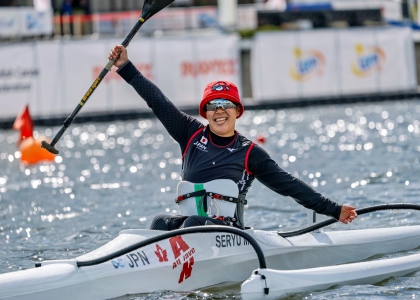Curtis McGrath knew the question was coming, so he thought he’d get in early to answer it.
If he could turn the clock back to August 23, 2012 – the day he stood on an improvised explosive device and lost the bottom half of both his legs – would he?
No, he says, he wouldn’t change a thing.
“I always say I wouldn’t, because the people that I’ve met, the places I’ve got to go, and the experiences that I’ve had, I wouldn’t have had them any other way,” he said.
“It’s a remarkable journey and I’m very privileged, and I don’t take it for granted that I get these opportunities now. You get home at night and you pinch yourself sometimes about what is going on.”
His life hanging in the balance, the comment he made to his shocked platoon as they rushed him to a medivac helicopter has taken on legendary status. He told them they will soon see him competing at the Paralympic Games.
“The reasons those words came out of my mouth, it wasn’t really a promise, it was more just hopeful words because I could see that the guys around me that were carrying the stretcher were dealing their own trauma because of the situation,” McGrath told the ICF’s Path to Paris podcast.
“They were hurting, and it was apparent to me that if I could say anything to hopefully lighten the mood, and be optimistic about what had happened, given the extent of my injuries, I didn’t really know what that would be.
“But I said you guys will see me in the Paralympics. It was just a comment, a passing comment made in jest, but at the same time it’s a comment that often gets brought up about my story, and who I am, what I’ve done and where I’m going. I’m very proud of what I said, and hopefully it helped those guys that day and beyond that, because that trauma is long lasting and takes a long time to heal.”
As it turns out they did see him at the Paralympic Games – two of them so far, in fact. He won a paracanoe gold medal at the sport’s Games debut in 2016, and another two in Tokyo. It’s thrust McGrath into the position of a role model, not just for wounded soldiers, but for people all over the world who have limb impairments.
“I’m making the best of my opportunities, and I think other people’s opportunities will be completely different to mine, but the outcome might be the same,” McGrath said.
McGrath opens up in the latest Path to Paris podcast about the day of the explosion, the tough days that followed, how he became the greatest paracanoe Paralympian, and the pressures that go with being a role model.
He also uses his own experiences to provide insights into the challenges confronting para athletes every day.
You can listen to the full Path to Paris podcast here. You can also listen to previous podcasts with Danish two-time Olympian Emma Jorgensen, and Iranian refugee athlete Amir Rezanejad.





